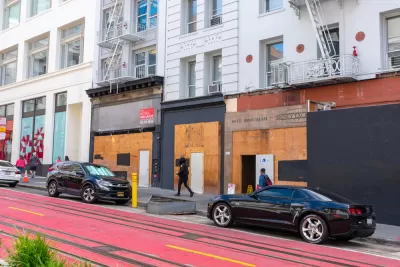New Census data break down San Francisco’s population losses during the first year-plus of the pandemic by race and age.

The early months of the pandemic were rife with stories about urban dwellers decamping to more suburban and rural climes, reinvigorating real estate markets around the country, sending waves of new residents to small towns, and driving up housing costs in so-called "zoom towns." Though a number of studies have been released in the ensuing years revealing the reality of out-migration to be much more complicated than of the headline-friendly version of the Covid-19 “urban exodus.”
Some cities did lose population, however, including San Francisco, which lost a decade’s worth of population growth in a year [paywall]. According to a paywalled article by Susie Neilson in the San Francisco Chronicle, detailed data from the U.S. Census Bureau now makes it possible to get very specific about the demographics of the city’s population loss.
Quoting the headline of the story, here’s the “exact type of person who was most likely to leave San Francisco in the pandemic”: white and young.
“The data shows that young people in general were more likely to leave the city. The city lost about 20% of all residents age 25 to 29 over this time and 15% of those 20 to 24,” according to Nielson.
“These findings make intuitive sense. People in their twenties and early thirties in San Francisco are far less likely to own homes than older adults, making it both harder to afford the city and easier to leave it,” adds Nielson.
The article includes an infographic laying out the population trends by race and age cohort between April 2020 and July 2021. At the other end of the spectrum, moving into the city, are white and Asian people over the age of 70.
FULL STORY: Here is the exact type of person who was most likely to leave San Francisco in the pandemic

Planetizen Federal Action Tracker
A weekly monitor of how Trump’s orders and actions are impacting planners and planning in America.

San Francisco's School District Spent $105M To Build Affordable Housing for Teachers — And That's Just the Beginning
SFUSD joins a growing list of school districts using their land holdings to address housing affordability challenges faced by their own employees.

The Tiny, Adorable $7,000 Car Turning Japan Onto EVs
The single seat Mibot charges from a regular plug as quickly as an iPad, and is about half the price of an average EV.

Seattle's Plan for Adopting Driverless Cars
Equity, safety, accessibility and affordability are front of mind as the city prepares for robotaxis and other autonomous vehicles.

As Trump Phases Out FEMA, Is It Time to Flee the Floodplains?
With less federal funding available for disaster relief efforts, the need to relocate at-risk communities is more urgent than ever.

With Protected Lanes, 460% More People Commute by Bike
For those needing more ammo, more data proving what we already knew is here.
Urban Design for Planners 1: Software Tools
This six-course series explores essential urban design concepts using open source software and equips planners with the tools they need to participate fully in the urban design process.
Planning for Universal Design
Learn the tools for implementing Universal Design in planning regulations.
Smith Gee Studio
City of Charlotte
City of Camden Redevelopment Agency
City of Astoria
Transportation Research & Education Center (TREC) at Portland State University
US High Speed Rail Association
City of Camden Redevelopment Agency
Municipality of Princeton (NJ)





























